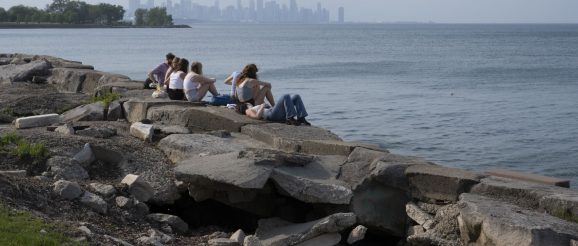Chicago ‘innovation hub’ awarded $160 million to extract harmful chemicals from Great Lakes

A Chicago-based “innovation hub” affiliated with the University of Chicago got a $160 million boost for the development of a technique to remove harmful chemicals from the Great Lakes, thanks to a grant from the National Science Foundation (NSF). The hub, Current, brings together corporations, universities, nonprofits and governments to pitch and develop climate solutions “that would be too risky or even impossible to undertake alone,” according to its mission statement. The nonprofit was founded in 2016 and is headquartered in Chicago. Announced by Gov. JB Pritzker late last month, Current was awarded the grant for its Great Lakes ReNEW initiative, a proposal to extract harmful “forever chemicals” from the Great Lakes. ReNEW is backed by six Great Lakes states: Illinois, Indiana, Michigan, Minnesota, Ohio and Wisconsin. The project has three central prongs: research and development, workforce training and translating innovations into practice. Current is developing methods of separating nickel, cobalt, lithium, nitrogen and PFAs from the water supply. The goal is to ensure that the Great Lakes will be a sustainable source of clean water in the future. Under ReNEW’s proposal, these chemicals and minerals would be repurposed by American manufacturers to be used for the production of batteries and other materials-heavy products, such as fertilizer. In addition to finding solutions for forever chemical removal, ReNEW also aims to train hundreds of workers in the next two years to join the “blue economy” in jobs that focus on STEM innovation and environmental preservation, according to their website. Once ReNEW comes up with solutions, the third prong of their mission comes into effect. Current says that they will launch and invest in “dozens” of water tech startups that will put water innovation into long-term practice. The project’s research is spearheaded by Juhong Chen, a co-principal investigator of Great Lakes ReNEW, a professor at the U. of C.’s Pritzker School of Molecular Engineering and Lead Water Strategist at Argonne National Laboratory. “A water-quality expert with decades of expertise in real-time water quality monitoring and detection, Chen provided the scientific vision for the project,” a U. of C. spokesperson said. Alina Harkness, the executive director of Current who is also the principal investigator and CEO of Great Lakes ReNEW, added that the U. of C. “was a founding member of Current’s Research Consortium (since 2016).” All institutions in the consortium contribute financially to Current on a recurring basis. The official start date of the project is March 1. Students and postdocs from Chen’s research group and other U. of C. research groups will be involved on the research side of the project. The grant, which will be disbursed over 10 years, is part of the inaugural class of NSF Regional Innovation Engines. ReNEW was one of 10 groups selected out of more than 700 submissions. “We have all the research and commercialization strengths here in the Great Lakes region to become a water innovation superhighway,” said Chen in a statement. “Now we can start building it.” In addition to the NSF award, Illinois has pledged $2 million in state funding to support the program. “This engine will be anchored in Chicago, which is becoming a national epicenter for clean water innovation,” said Chicago Mayor Brandon Johnson in a statement. “I want to congratulate Current, the University of Chicago, and Argonne National Laboratory for their ambition and ingenuity, which is going to create an untold number of jobs right here throughout the lifecycle of this grant.” “Water is needed everywhere for daily life. For manufacturing in particular, it is critical to our economic prosperity. But water is limited in supply, especially freshwater,” Chen told The Herald. “The only way to get us out of this challenge is to be able to recycle and reuse the water.”
